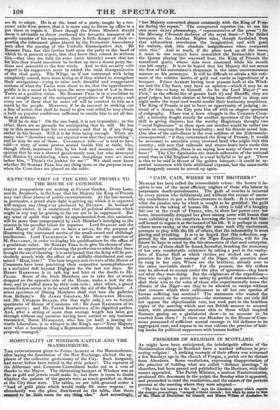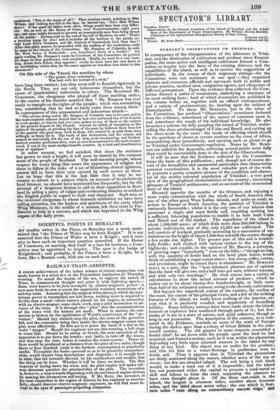PROGRESS OF RELIGION IN SCOTLAND.
As might have been anticipated, the indefatigable efforts of the Nonintrusion clergy in Scotland have a marked influence in pro- moting religion ! A striking example of their efforts was witnessed a few Sundays ago in the church of Forgue, a parish not far distant from Aberdeen. Some resolutions, expressing disapprobation of the practice of holding what are called "defence meetings" in churches, had been passed and published by the Heritors, with their names appended. The Parish Minister, a zealous Nonintrusionist, produced this document in the pulpit the Sunday after it appeared, and proceeded to read the resolutions, and the names of the persons present at the meeting where they were adopted— "The first few names on the list," says the Abenleen paper which reports the strange proceedings, "escaped without remark; but when he came to that- of Mr. Timm of Drurnblair for himself, and Misses Wilson of Auebaber, be
exclaimed, This is the worst of all I ' Then turning round, pointing to Miss Wilson, and looking her full in the face, he bawled out, 'Yes! Miss Wilson there! If her good old father were alive, things would have been very differ- ent. He, as well as Mr. Henry of Corse, were Nonintrusionists eight years ago, and came boldly forward to prevent an unacceptable man from being thrust on the parish.' Having read to the end of the roll of Heritors, he said, That's a precious troop for you! and it includes all the heritors in the parish, ex- apt Lord Fife's Trustees, and Mr. Garioch of Geariesford, God bless him After this pithy prayer, be proceeded with the reading of the resolutions, until he came to the names of the Committee. Mr. Simpson of Cobairdy, he said, Mr. Rose Innes of Netherdale : yes, braythren! fowls of a feather !' On again reading Mr. Simpson's name as Convener of the Committee, he pointed his finger to that gentleman, and exclaimed, 'Really, he must be a very bust- ling, active little fellow, that opposite ! surely he must have the very heart of an Archbishop within him, for his name appears no less than four times in this document."
On this aide of the Tweed, the worthies by whom
"The pulpit, drum ecclesiastic, Was beat with fist instead of a stick,"
have long been extinct ; but they seem still to flourish vigorously in the North. They are not only indecorous themselves, but the cause of (pardonable) indecorum in others. The Reverend Mr. CORDINER, the clergyman who played off these startling antics, in the course of his diatribe asserted that " Mr. Simpson was ever ready to trample on the rights of the people; which was astonishing too, considering that he had so lately come from among them. In consequence of this unmeasured and indecorous attack- " The service being ended, Mr. Simpson of Cobairdy rose in his seat, and in the most emphatic manner denied that he had ever canvassed any of his tenants or work-people, or that he had ever even spoken to any of them on the subject of the present dispute in the Church. Instead, he added, of trampling on the rights of the people, or grinding the face of the poor, he believed there were few in the quarter who gave more work to those who wanted it, or paid them more willingly or freely for it. The truth of this declaration, and the esteem and respect so universally felt for one of the best, most unassuming, and kindest- hearted country gentlemen alive, were at once demonstrated in the most unequi- vocal, if not in the most unobjectionable manner, by a loud and simultaneous burst of applause."
In sober earnest, we feel satisfied, that since the nuisance has grown to such a height, it will soon be abated by the common sense of the people of Scotland. The well-meaning people, whose respect for every thing that wears the appearance of religion led them to follow in the wake of a set of blustering clerical agitators, cannot fail to have their eyes opened by such scenes as these. Let us hope that this is the last time that it may be ne- cessary to advert to a subject which, on account of its exclusively local interest, we should have mentioned less frequently, but for the attempt of a desperate faction to add to their supporters in Scot- land by aiding a party of vulgar and overbearing fanatics to mislead the English public in regard to their real character. Such men as the reverend clergyman to whose fantastic exhibition we have been calling attention, are the leaders and specimens of the party which Whig Ministers, in the middle of a session, left their seats in Par- liament to help in a canvass, and which was bepraised in the Whig organs of the daily press.



























 Previous page
Previous page